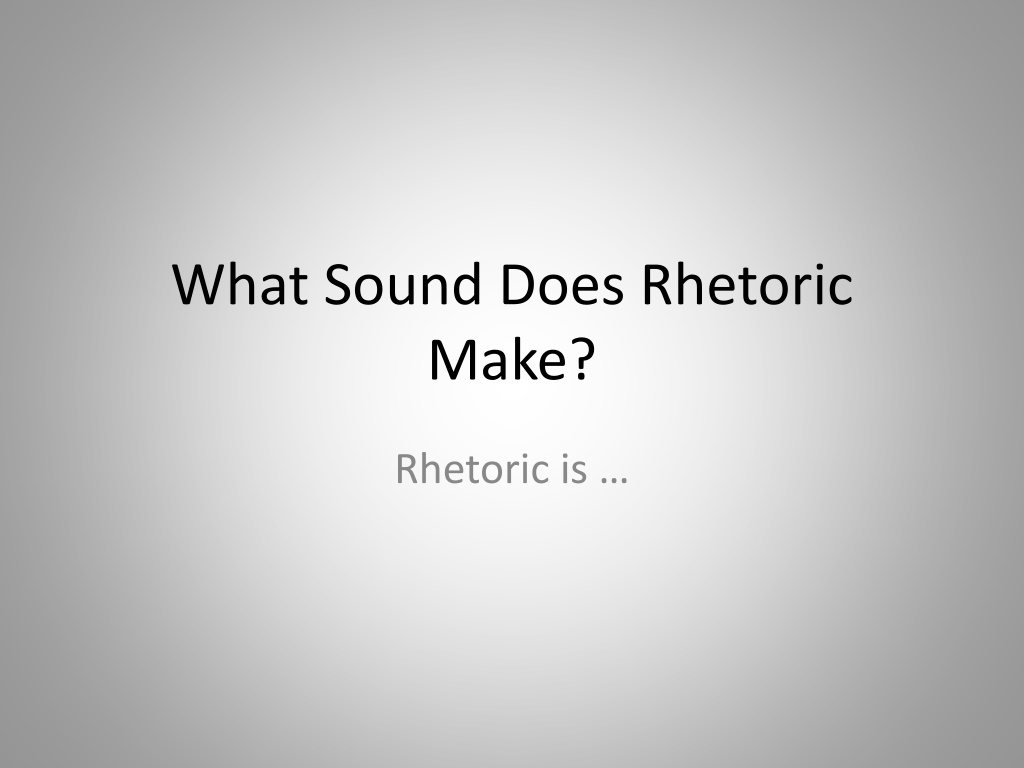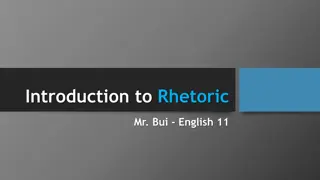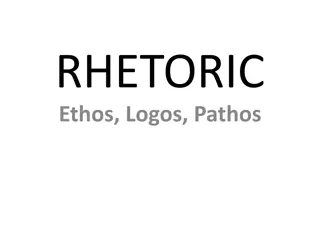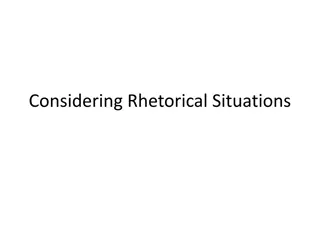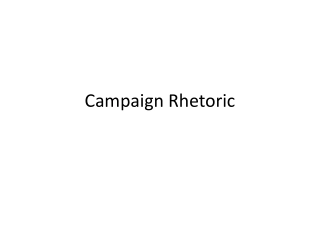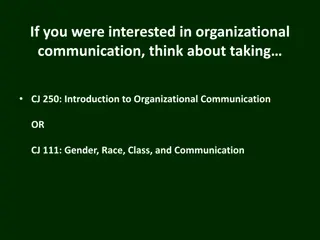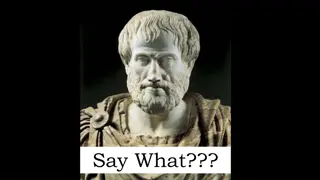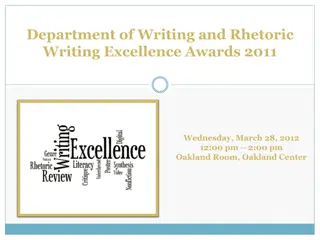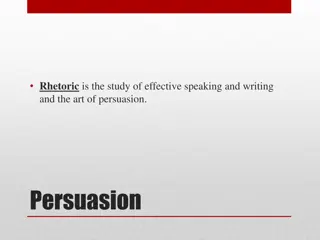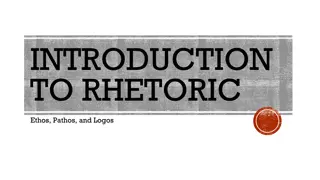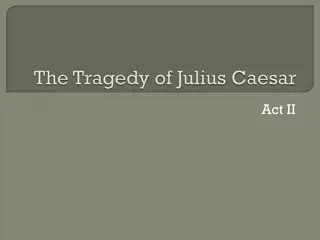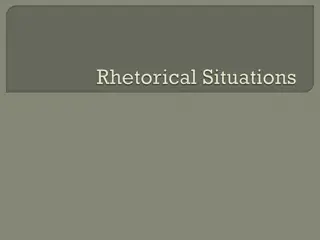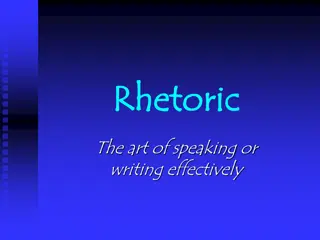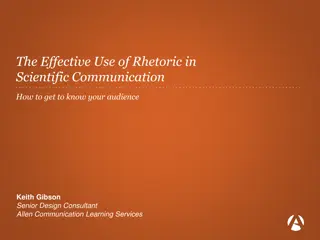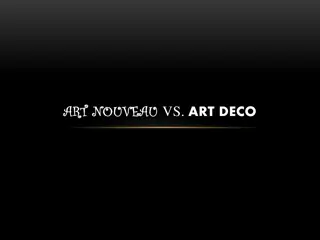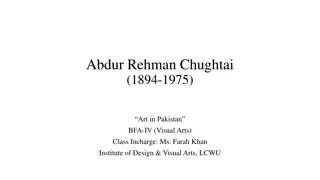Understanding the Art of Rhetoric
Explore the diverse perspectives on the concept of rhetoric, ranging from Plato and Aristotle to modern thinkers like Henry Ward Beecher and Andrea Lunsford. Rhetoric is depicted as the art of persuasion, with various scholars defining it as enchanting the soul, discovering means of persuasion, or influencing conduct through communication. Delve into the essence of rhetoric and its impact on human interaction and societal discourse.
Download Presentation

Please find below an Image/Link to download the presentation.
The content on the website is provided AS IS for your information and personal use only. It may not be sold, licensed, or shared on other websites without obtaining consent from the author. Download presentation by click this link. If you encounter any issues during the download, it is possible that the publisher has removed the file from their server.
E N D
Presentation Transcript
What Sound Does Rhetoric Make? Rhetoric is
Scholarly Definitions of Rhetoric Plato: [Rhetoric] is the "art of enchanting the soul." (The art of winning the soul by discourse.) Aristotle: Rhetoric is "the faculty of discovering in any particular case all of the available means of persuasion." Cicero: "Rhetoric is one great art comprised of five lesser arts: inventio, dispositio, elocutio, memoria, and pronunciatio." Rhetoric is "speech designed to persuade." Quintilian: "Rhetoric is the art of speaking well" or "...good man speaking well." Francis Bacon: The duty and office of rhetoric is to apply reason to imagination for the better moving of the will. George Campbell: "[Rhetoric] is that art or talent by which discourse is adapted to its end. The four ends of discourse are to enlighten the understanding, please the imagination, move the passion, and influence the will.
Henry Ward Beecher:Not until human nature is other than what it is, will the function of the living voice-the greatest force on earth among men-cease...I advocate, therefore, in its full extent, and for every reason of humanity, of patriotism, and of religion, a more thorough culture of oratory and I define oratory to be the art of influencing conduct with the truth set home by all the resources of the living man. I. A. Richards: Rhetoric is the study of misunderstandings and their remedies. Erika Lindemann: "Rhetoric is a form of reasoning about probabilities, based on assumptions people share as members of a community." Philip Johnson: "Rhetoric is the art of framing an argument so that it can be appreciated by an audience." Andrea Lunsford: "Rhetoric is the art, practice, and study of human communication." Kenneth Burke: "The most characteristic concern of rhetoric [is] the manipulation of men's beliefs for political ends...the basic function of rhetoric [is] the use of words by human agents to form attitudes or to induce actions in other human agents."
What Sound Does Rhetoric Make? First, you must get the tune to Old MacDonald in your head.
Public Speaking had a forum, e-i-e-i-o. And on that forum we had a
B U L L (FROM CHICAGO)
Dennis Rodman and the Art of the (Metaphoric) Screen Phase #1: You are about to experience truth -- someone's version of it. Some years ago a now-infamous incident occurred in the world of professional basketball. The participants included a basketball player, a referee, a cadre of players and coaches, and ten thousand or so fans. You are about to read two different accounts (or versions) of the same incident. You will likely see some differences between them, although the differences lay not so much in matters of "fact" as in the strategic use of metaphors and other rhetorical devices by which each account is given its particular rhetorical character. As you read them, consider the affect each version is likely to have on audiences who did not actually witness the event, and/or, who experienced only a single written version.
Screen Version #1 Chicago Bulls forward Dennis Rodman faces yet another suspension by the NBA for his dangerous tirade in Saturday night's game at Chicago. Rodman was ejected with 1:31 left in the first quarter after receiving his second technical foul. Rodman then proceeded to head-butt referee Ted Bernhardt, catching him just above the left eye. In typical fashion, Rodman then ripped off his shirt and stormed around the court, pausing briefly to knock over a water cooler in front of a group of stunned young boys before finally leaving.
Screen Version #2 Chicago Bulls forward Dennis Rodman faces a suspension by the NBA for his wild and theatrical behavior in Saturday night's game at New Jersey. Rodman was given his notice of leave with 1:31 left in the first quarter of Saturday's game after receiving his second technical foul. Rodman appeared to have bumped an official during a heated discussion over the foul. Consistent with past heroics, and to the delight of the Chicago faithful, Rodman then removed his shirt as he paraded around the court before finally exiting stage left into his team's locker room.
Dennis Rodman and the Art of the (Metaphoric) Screen Phase #2: So, is Rodman a lunatic or some kind of anti- hero? Let's look closer. Put on your "Metaphoric Goggles" and view each version as a professional rhetorician or "wordsmith" would. Can you mark the author s deliberate efforts to manipulate through word choice? Might as well; the folks who wrote these versions are counting on you not to use them. It would give too much of their trade away. Go ahead. Be a rebel.
Juxtapose Screen Version #1 Screen Version #2 Chicago Bulls forward Dennis Rodman faces yet another suspension by the NBA for his dangerous tirade in Saturday night's game at Chicago. Rodman was ejected with 1:31 left in the first quarter after receiving his second technical foul. Rodman then proceeded to head-butt referee Ted Bernhardt, catching him just above the left eye. In typical fashion, Rodman then ripped off his shirt and stormed around the court, pausing briefly to knock over a water cooler in front of a group of stunned young boys before finally leaving. Chicago Bulls forward Dennis Rodman faces a suspension by the NBA for his wild and theatrical behavior in Saturday night's game at New Jersey. Rodman was given his notice of leave with 1:31 left in the first quarter of Saturday's game after receiving his second technical foul. Rodman appeared to have bumped an official during a heated discussion over the foul. Consistent with past heroics, and to the delight of the Chicago faithful, Rodman then removed his shirt as he paraded around the court before finally exiting stage left into his team's locker room.
Dennis Rodman and the Art of the (Metaphoric) Screen Phase #3: So, you've seen how language acts as a filter or "screen" through which truth is both colored and experienced. Language screens filter truth in the way that different shades of glasses filter light. Consider, then, in light of what you've seen, the following questions: Qa: Is there really such a thing as "pure truth, considering how humans use and abuse language? Qb:Is the "truth" merely a matter of "reporting" the "facts? Qc: Had you been an eye witness, how would your version of this drama constitute the truth? Rhetorical Lesson: Whatever counts as truth is, in part, a function of the way we use language to exert our persuasive (i.e., rhetorical) influence on others. Truth, in this view, is both process and product of our rhetorical practices.
Lets give it a try: Chicago Bulls forward Dennis Rodman faces a suspension by the NBA for his _______________________________ in Saturday night's game at Chicago. Rodman was _______________________ with 1:31 left in the first quarter of Saturday's game after receiving his second technical foul. Rodman appeared to have ___________________________ during ____________________ . Consistent with _________________________ and ____________________________ Rodman then __________________________ his shirt and _______________________________ the team's locker room. Now, consider your words wisely for the next five speeches, using rhetoric to STRENGTHEN your FORUM and encourage your audience to buy-in to what you are saying.
